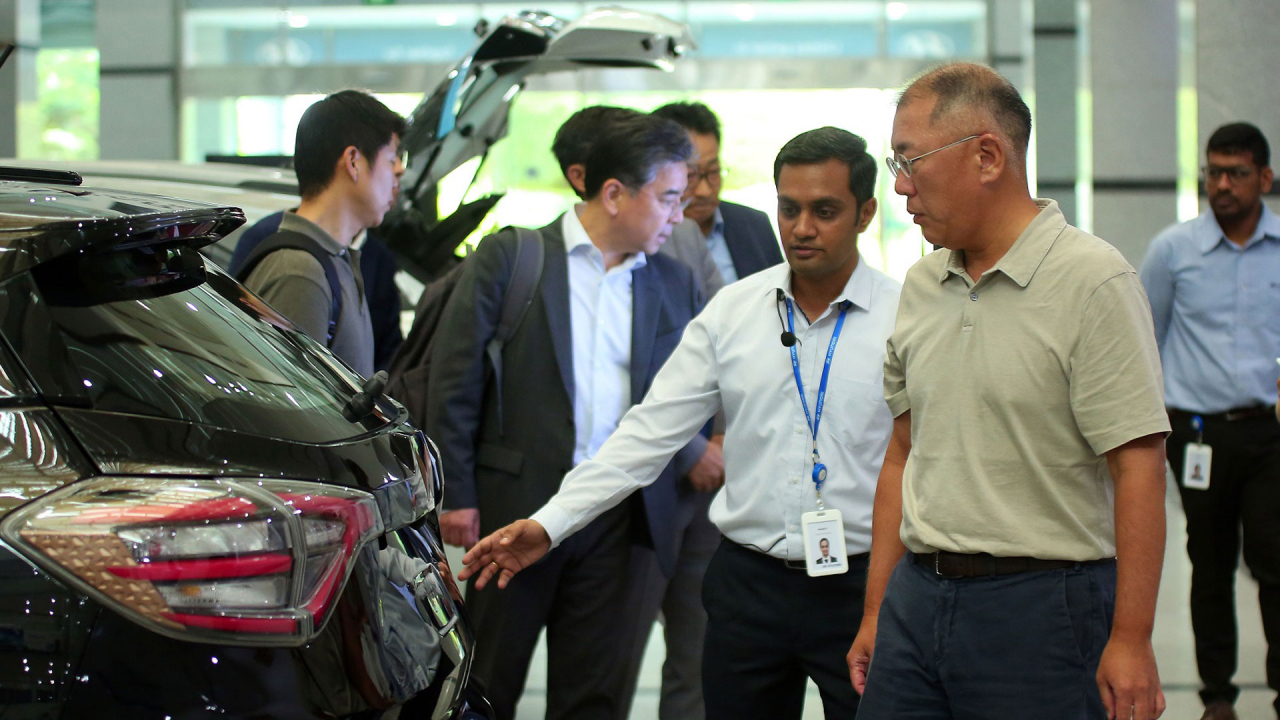 |
Hyundai Motor Group Executive Chair Chung Euisun looks around the automaker's facility in India in August. (Hyundai Motor Group) |
Hyundai Motor Group has set its sights on the Southeast Asian region in search of alternative markets outside of China and Russia as the Korean automaker looks to move beyond its heyday in the two state-dominated nations.
Hyundai Motor’s Chinese business used to boast upbeat sales of over 1 million units per year with five local manufacturing plants in operation. This came to an abrupt end in 2017 when Beijing took retaliatory actions against South Korean companies in response to Seoul’s decision to bring in the US Terminal High-Altitude Area Defense System, or THAAD, to counter missile threats from North Korea.
Since then, sales declined and some of the plants had to halt operations. The downturn led to Hyundai Motor’s sell-off of its first Beijing factory in 2021. The automaker put its Chongqing plant up for sale in August this year. Hyundai Motor’s Changzhou plant is expected to be up for sale in the future, eventually shrinking the company’s manufacturing foothold in China from five facilities to two.
Earlier this month, the automaker also announced the decision to sell its manufacturing plant in Russia, putting an official end to its local operation. The plant, which once had an annual production capacity of some 230,000 units, was shut down after Russia invaded Ukraine in February 2022. The sell-off includes a General Motor plant site Hyundai Motor acquired in 2020.
The Korean auto giant’s two brands -- Hyundai and Kia -- enjoyed an increase in popularity after its Russian plant began operations in 2011. The two brands accounted for about one-quarter of the total market share in 2018, making Hyundai Motor Group the biggest auto manufacturer in the country.
Regarding the company's fallouts in the two countries, auto experts point to geopolitical uncertainties out of the private sector's control. In response, the Korean automaker has been trying to find answers elsewhere, prompting Hyundai Motor Group Executive Chair Chung Euisun's visits to India and Indonesia in August and September, respectively.
With the world’s largest population of 1.4 billion, India became the third biggest auto market behind China and the US in 2022, as some 4.76 million new vehicles were sold there. The local passenger car market, which accounted for 3.8 million units, is projected to reach 5 million in 2030. Of them, over 1 million are expected to be all-electric vehicles as the Indian government looks to expand the proportion of EVs to 30 percent of total sales by 2030.
Hyundai Motor has held the No. 2 spot in the Indian auto market but its position is being threatened by Tata Motors, under the Indian conglomerate Tata Group. According to a global auto industry analysis by Marklines, Hyundai and Kia have sold approximately 800,000 units in India from January to November, whereas Tata Motors sold about 850,000 units during the same period.
Hyundai Motor said it will continue to release sports utility vehicles tailored to the Indian market, such as the Exter, a compact SUV that recently won the Indian Car of the Year award after it was launched there in July. Hyundai and Kia vowed to introduce several new EVs in the coming future and expand the local charging infrastructures to aid the EV transformation there. Hyundai Motor also plans to bulk up the local production capacity to 1 million units per year, acquiring GM’s Indian plant at an undisclosed price in August.
For Hyundai Motor, the Indonesian market appears to have more hurdles compared to India, as the local market is dominated by Japanese brands. Hyundai Motor said it expects to see a market share of 3.9 percent by the end of the year.
The Korean automaker’s blueprint aims to focus on the EV transformation in Indonesia, which has a population of about 274 million people and is the fourth largest country in the world. Hyundai Motor is setting up the Association of Southeast Asian Nations' first complete EV chain as it is building a joint battery cell plant with LG Energy Solution.
The automaker is pinning its hopes on Indonesia to become the main hub for the ASEAN market. Hyundai Motor expects Thailand and Malaysia to lead the EV transformation in the ASEAN region with Indonesia and Vietnam following the trend. The automaker said that as each ASEAN country puts more emphasis on EVs, the EV market will continue to grow there with EVs forecast to take up 15 percent of the total auto market in 2030.







![[Today’s K-pop] Blackpink’s Jennie, Lisa invited to Coachella as solo acts](http://res.heraldm.com/phpwas/restmb_idxmake.php?idx=644&simg=/content/image/2024/11/21/20241121050099_0.jpg)